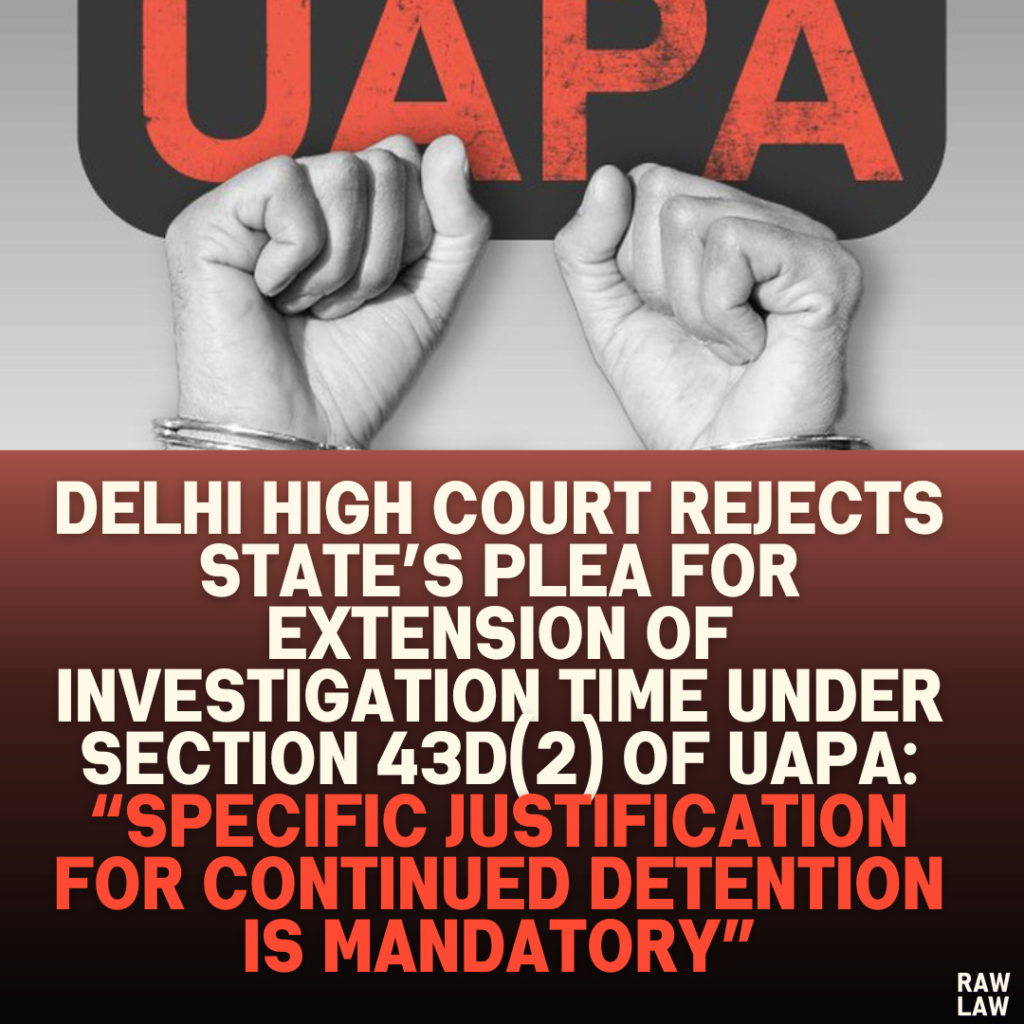Court’s Decision
The Delhi High Court upheld the Trial Court’s rejection of the State’s application seeking an extension of the investigation period beyond the statutory 90 days under Section 43D(2) of the Unlawful Activities (Prevention) Act, 1967 (UAPA). The Court emphasized that while the State demonstrated progress in the investigation, it failed to provide specific and sufficient reasons for the continued detention of the accused. The failure to meet these legal requirements rendered the request untenable, thereby entitling the accused to default bail.
Facts
- Initial Investigation:
- On 15th July 2024, an FIR was registered under Section 61 of the Bharatiya Nyaya Sanhita (BNS), 2023, at the Special Cell (Delhi), based on secret intelligence inputs.
- Intelligence suggested that a Jharkhand-based radicalized group, with sympathizers in and around Delhi, was planning a terror attack.
- Addition of Charges:
- During the investigation, additional charges under the following statutes were added:
- Sections 4 and 5 of the Explosive Substances Act, 1908.
- Section 25 of the Arms Act, 1959.
- Sections 16, 17, and 18 of UAPA (terror-related provisions).
- During the investigation, additional charges under the following statutes were added:
- Arrests and Recoveries:
- Raids were conducted across Delhi, Rajasthan, Jharkhand, and Uttar Pradesh.
- Key recoveries included:
- Weapons (handmade SLRs, carbines).
- Suspicious literature.
- Cash amounts.
- Multiple individuals were arrested, including those alleged to have undergone weapons training in Rajasthan.
- Application for Extension:
- The State, unable to complete the investigation within the 90-day statutory period under UAPA, filed an application seeking an extension of 90 more days.
- The application was supported by a Public Prosecutor’s report, as required under Section 43D(2) of UAPA.
- Trial Court’s Decision:
- The Trial Court dismissed the application, stating that while the report showed progress in the investigation, it lacked specific justification for continued detention.
Issues Before the Court
- Whether the Trial Court erred in rejecting the State’s plea for extension of the investigation period?
- Whether an order rejecting extension under Section 43D(2) of UAPA is appealable under Section 21 of the NIA Act?
Petitioner’s Arguments (State)
- Complex Investigation:
- The case involved a large-scale conspiracy with multiple accused, cross-border implications, and voluminous electronic and forensic data that required extensive analysis.
- A failure to grant the extension would hinder the prosecution and allow the accused to seek default bail.
- Compliance with Section 43D(2):
- The State argued that the Public Prosecutor’s report sufficiently demonstrated progress in the investigation and outlined the need for continued detention.
- The accused were heard before the Trial Court, ensuring procedural fairness.
- Impact of Default Bail:
- Granting default bail without concluding the investigation would cause serious prejudice to the case.
Respondent’s Arguments
- Lack of Justification:
- The Respondents argued that the same reasons for detention were cited repeatedly over multiple hearings, reflecting a lack of new or substantial material.
- Under Section 43D(2), it is not sufficient to show only progress; the State must provide specific justification for continued detention.
- Stringent Timelines:
- Relying on Hitendra Vishnu Thakur v. State of Maharashtra (1994), the Respondents contended that extensions cannot be granted mechanically and must be exceptional.
- Repeated Requests:
- Despite being given multiple opportunities for police remand, the State failed to conclude the investigation.
Analysis of the Law
- Statutory Framework:
- Under Section 43D(2) of UAPA, the Court may extend the 90-day limit for completing the investigation to 180 days, provided:
- The Public Prosecutor’s report shows progress in the investigation.
- There are specific reasons justifying continued detention.
- Under Section 43D(2) of UAPA, the Court may extend the 90-day limit for completing the investigation to 180 days, provided:
- Purpose of the Provision:
- The provision balances the need for a thorough investigation in serious cases with the accused’s right to liberty, as protected under Article 21 of the Constitution.
- Court’s Findings:
- While the State demonstrated progress in the investigation, it failed to provide new or compelling reasons for extending the detention.
- Repeated reliance on identical grounds undermines the credibility of the request.
- The Trial Court rightly held that without specific justification, the accused cannot be denied the benefit of default bail.
Precedent Analysis
The Court relied on the following key decisions:
- Hitendra Vishnu Thakur v. State of Maharashtra (1994):
- Extensions under special statutes like UAPA must satisfy both progress and justification criteria.
- State of Maharashtra v. Surendra Pundlik Gadling (2019):
- A mechanical extension without sufficient grounds violates the accused’s right to bail.
- M. Ravindran v. Directorate of Revenue Intelligence (2021):
- Default bail is not a mere statutory right but a constitutional safeguard under Article 21.
Court’s Reasoning
- The State failed to meet the dual requirements under Section 43D(2):
- While the investigation showed progress, there was no clear justification for continued detention.
- The Public Prosecutor’s report lacked specificity and repeated previously cited grounds.
- Denying bail in such cases would violate the accused’s fundamental right under Article 21, as extensions under UAPA must be granted sparingly and with due justification.
Conclusion
The Delhi High Court dismissed the appeal, stating:
- “Merely showing progress in the investigation without providing specific justification for detention is insufficient under Section 43D(2) of UAPA.”
The Court upheld the Trial Court’s order and directed the State to comply with statutory safeguards.
Implications
- Strict Application of UAPA:
- The judgment reaffirms the stringent procedural safeguards under UAPA, preventing mechanical extensions of the investigation timeline.
- Right to Default Bail:
- The ruling highlights that default bail is a constitutional safeguard under Article 21 and cannot be denied without compelling justification.
- Impact on Investigations:
- Investigating agencies must ensure that requests for extension are supported by new, substantial material and not merely progress reports.



